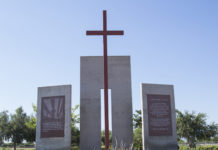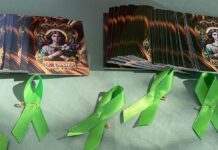
Theologian and foremost papal biographer George Weigel drew a crowd of more than 400 people to the Virginia G. Piper Center for the Performing Arts at Xavier College Preparatory Jan. 26 for a lecture about the life of Blessed John Paul II.
The lecture and book signing were a fundraiser for the John Paul II Resource Center founded by Bishop Thomas J. Olmsted of the Diocese of Phoenix in 2006. Katrina Zeno, who helped found the resource center, gave the opening remarks.
“Blessed John Paul II was a man of faith,” Zeno said. The late Holy Father placed his hand on Zeno’s forehead 20 years ago and blessed her in what became a turning point in her life.
Zeno, who is studying for her master’s degree at the John Paul II Institute in Washington, D.C., spoke about the mission of the resource center, based at Mount Claret Retreat Center.
“When Mary said yes, Trinitarian love erupted into her soul and flesh,” Zeno said. “That’s the mission of the John Paul II Resource Center.”
Catherine Mulhern, 19, spoke to the crowd as a graduate of the pilot program for the Catholic Academy for Life Leadership, or C.A.L.L., a catechetical and formation program of the JP II Resource Center that trains high school students in the Theology of the Body and bioethics. C.A.L.L. also promotes service to others.
“The C.A.L.L. program helped me to really understand my faith, choose it as my own, love it and desire to share it with everyone I encounter,” Mulhern said. “My experience with C.A.L.L. was truly amazing.”
Weigel, author of numerous books, including the best-selling “Witness to Hope,” a biography of Blessed John Paul II, described seven qualities the late pontiff embodied. He portrayed Blessed John Paul as “a uniquely emblematic figure of the second half of the 20th century.”
The best-selling author, who enjoyed the close cooperation of both the former pontiff and high-ranking Vatican officials in the writing the two-volume biography, said that if he could choose just one word to describe the late pope, it would be “disciple.”
“Discipleship — faithful adherence to the Lord Jesus Christ — was the bright thread connecting the rich tapestry of the life of Karol Wojtyla, Pope John Paul II.”
In his hour-long lecture, Weigel said he hoped the portrait he painted of Blessed John Paul, whom he described as a “radically converted Christian disciple,” would inspire others to live their Catholic beliefs more authentically, particularly during the Year of Faith.
Weigel said that Blessed John Paul lived from a deeply Polish soul and that this was a reference not so much to language or geography, but rather to Poland’s unique history. The eastern European country disappeared from the map from 1795-1918, yet the Polish nation survived, Weigel said, in large measure due to the intense Catholic faith of the people.
Blessed John Paul, he said, was not a politician, but he called on the Polish people to reclaim their Christian identity, and it was his charismatic leadership that helped galvanize the Solidarity movement and led to the eventual disintegration of the Union of Soviet Socialist Republics.
Weigel said that the late pope was also deeply influenced by Carmelite spirituality and a deep devotion to the Blessed Mother. This devotion was not, as some claimed, due to the loss of his mother early in life, but rather a result of the impact of St. Louis de Monfort’s classic work, “True Devotion to Mary.”
Blessed John Paul was a dramatic soul, Weigel said, influenced by his interest in theater and possessing both a wonderful sense of timing and a knack for connecting with crowds.
Although he was pope, Weigel said, Blessed John Paul had a layman’s soul. Unlike popes for the previous two centuries, he did not enter a minor seminary as a young man and had planned to live as a layman. The late pope’s friends told Weigel that Blessed John Paul “knew their lives from the inside.”
Long before he became a priest, Weigel said, the late Holy Father understood what the Second Vatican Council would dub the “universal call to holiness.” He was also formed by a “profound sense of the human person,” and believed that “the idea of the human person had gone off the rims, leading us ultimately, to the vast slaughters of mid 20th century, World Wars, the persecution of the Church, Roe vs. Wade, and the great slaughter of the new holy innocents.”
Attendees lined up after Weigel’s lecture to purchase his latest book, “Evangelical Catholicism” as well as paperback copies of “Witness to Hope.” The distinguished senior fellow at the Ethics and Public Policy Institute based in Washington, D.C. signed copies as guests mingled and enjoyed an array of desserts and coffee.






